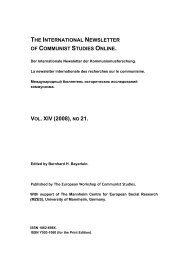11RXNdQ
11RXNdQ
11RXNdQ
You also want an ePaper? Increase the reach of your titles
YUMPU automatically turns print PDFs into web optimized ePapers that Google loves.
Colonialism and Neocolonialism 98<br />
that Congolese independence was not an end in itself but the beginning of a struggle to<br />
the death to win national sovereignty. The Belgians’ departure could be obtained by an<br />
internal organization; after their departure, danger could only be averted by an external<br />
policy. The young nation, having lost its masters without finding the means of exerting its<br />
freedom, would be obliged to rely on less young states that had already attained<br />
sovereignty; it would have to support national movements in the colonies which<br />
surrounded it. For this reason, Lumumba emphasized in his Accra speech the<br />
interdependence of the two objectives that the conference finally established and which<br />
for good reason are, in his mind, one and the same thing: ‘the struggle against internal<br />
and external factors that constitute an obstacle to the emancipation of our respective<br />
countries and to African unification’. He was, however, too involved in the political<br />
struggle for liberation to stress the fundamental aspect of pan-Africanism: that Africa<br />
cannot create itself without producing, for itself, an African market. The organization of a<br />
common market for the whole of the black continent involved other problems and other<br />
struggles: for the MNC, it was not yet the moment to envisage them. Neither was it the<br />
moment to discover and unravel the mystification contained, in many countries – for<br />
example in French Congo – in the prestigious word ‘independence’, especially since de<br />
Gaulle, by pronouncing it that year in Brazzaville, prompted real enthusiasm in the<br />
Belgian colony and at a stroke won over the most hesitant to hard-line demands. Be that<br />
as it may: what Lumumba lacked was an in-depth knowledge of the new nations and their<br />
infrastructures, with the result that he would realize too late that certain black states were<br />
by nature sworn enemies of Congolese independence. Above all, shaped by the most<br />
severe oppression and the most despicable segregation, he was unable to conceive of any<br />
adversary other than the old colonialism, an ancient machine that was so stiff that it had<br />
to crush or break up. It was against this that he was preparing to fight, and indeed, there it<br />
was, represented by the small colonists and the Administration. But the black leader did<br />
not suspect that this ogre, still so vigorous and vicious, was, in reality, already dead; nor<br />
that the imperialist governments and the large companies, confronted with the colonial<br />
crisis, had decided to liquidate the classic forms of oppression and the detrimental,<br />
ossified structures that had developed during the course of the preceding century. He was<br />
unaware that the old mother countries wished to entrust nominal power to ‘natives’ who<br />
would govern, more or less consciously, according to colonial interests; he was unaware<br />
that the accomplices or straw men had already been chosen in Europe, that they all<br />
belonged to the class recruited and trained by the Administration, to the petty bourgeoisie<br />
of employees and civil servants, to his own class. This ignorance was to be his downfall.<br />
He belonged to the elite, it is true, and was therefore cut off from the masses whom he<br />
was supposed to represent: his supporters were all petty bourgeois; if he won, he would<br />
have formed the first government with them. But his intelligence and his deep<br />
commitment to the African cause made him a black Robespierre. His project was both<br />
limited – politics first, the rest would come in time – and universal. ‘The Fathers’ had<br />
uprooted him from the traditional world of the non-évolués; at the start, intoxicated by his<br />
precocious knowledge, he had even made himself the spokesman of the elite, and<br />
demanded complete integration for them. But in the end it was his universalism which<br />
triumphed. This was doubtless an ideological principle of his class, and was, as we have<br />
seen, an optical illusion. But this humanism, which for other people masked the




